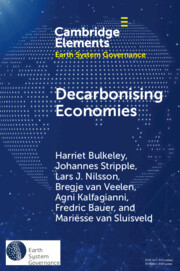Refine search
Actions for selected content:
2 results
4 - Climate Change
-
- Book:
- Economics for a Fragile Planet
- Published online:
- 24 March 2022
- Print publication:
- 31 March 2022, pp 74-104
-
- Chapter
- Export citation

Decarbonising Economies
-
- Published online:
- 28 January 2022
- Print publication:
- 24 February 2022
-
- Element
-
- You have access
- Open access
- HTML
- Export citation
